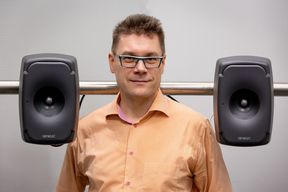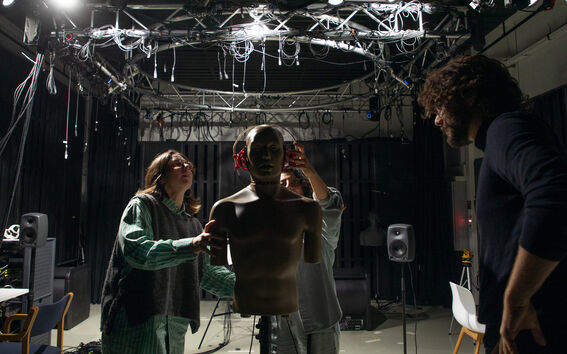Professor Tapio Lokki has been a familiar sight in Otaniemi for almost 30 years. However, he is a new acquaintance for many who work or study at the School of Electrical Engineering, as he recently moved from the School of Science Department of Computer Science to the Department of Signal Processing and Acoustics in the School of Electrical Engineering. The purpose of the transfer was to facilitate the life of students and researchers – previously acoustics teaching and related research that requires special equipment had been divided between two schools, which caused a variety of practical problems.
But what inspires the professor, and how did he end up studying acoustics?
What do you study and why?
I study room acoustics, the modelling of sound propagation, and the functions of human hearing. I am interested in how different spaces affect the way we hear sounds. I am best known for my research on concert hall acoustics, an area that I have studied for over 10 years.
In our field, researchers are often expected to be specialists on all things related to sound, and for this reason, I have ended up working on a wide range of different projects. At the moment, I am working on issues such as hearing in noise, meaning people's hearing difficulties in noisy spaces, and how hearing loss affects our capacity to hear in a noisy setting. Another interesting ongoing project of mine concerns virtual environments – I study the possibility of creating an authentic sound setting in a virtual environment. In addition, I am currently working with a Finnish company on producing sound-absorbing materials from cellulose, as at present these materials are usually made from glass wool or rock wool.
How did you become a researcher?
I ended up studying acoustics almost by accident around 25 years ago, when I became interested in virtual acoustics and auralization, that is the simulation and listening of sounds in virtual worlds – in other words, the ways in which we can simulate and listen to the acoustics of different spaces. As a result, I have become increasingly interested in discovering how accurately we actually can hear the properties of different spaces. My efforts led me to study concert halls – as the space modifies the sound, the properties of a concert hall have a massive impact on how we hear music.
I have been fascinated by sounds and music my whole life. I used to play the clarinet when I was younger, and I remember being curious to see how the clarinet music I recorded was visualised as sound waves on the computer. After upper secondary school, I ended up studying electrical engineering at the Helsinki University of Technology, and right from the start I knew that I wanted to continue my studies and receive a doctorate. I am a fourth-generation university professor, so I have always viewed this as one sensible career alternative.
One of the secrets for my success as a researcher may be that I have never been the best at anything. For example, I have played football and won the juniors’ Finnish championship, but I was never the best player in my team. I also used to play in an orchestra, and I was probably better than average but never the best. I would like students to remember that they do not have to get top grades for every course. It is always advisable to do things carefully and well, but the pursuit of perfection only gets tiresome in the long term and prevents you from accomplishing as much as you otherwise could.
What have been the highlights of your career?
My research on concert halls is definitely my greatest achievement. I am proud to say that we have been able to study and advance a field that has been studied for a long time. Thanks to this research, I am widely known as a concert hall researcher, and it is nice that my opinion is asked when new concert halls are being built. I have strong opinions about the acoustics of concert halls, and I am happy to help with the planning of new spaces.
My research is on my mind also when I am off the clock, and I often consider the acoustics of concert halls and other facilities when I attend concerts and events outside work. For example, I dislike the acoustics of the Musiikkitalo concert hall, so I avoid going there. The concert halls that I like the most are Konzerthaus Berlin, Concertgebouw in Amsterdam, and Musikverein in Vienna.
What kind of characteristics are required of a researcher?
Research work is not carried out alone, and project groups should have people with different characteristics and a diverse range of competence. I claim that in today's world, research is based so extensively on teamwork that professors must serve as good coaches who are tasked with assembling a team with the best possible strengths. Moreover, researchers are required to be patient and occasionally ready to bang their head against a wall.
A researcher is also required to have an open mind. The field of acoustics is extremely vast and multidisciplinary, and research often extends to as far as medicine and psychology, but also strongly to the fields of measuring and signal processing.
What are your expectations for the future?
In the future, I would like to focus more on my research on hearing, so that I could help more people through my work. I am interested in hearing in noise and, for example, the limits of the human hearing threshold. I am also interested in hearing problems and their causes in general. Discovering the mechanisms of hearing problems would, for example, help physicians to prescribe the right hearing aids to those who need them. At present, finding the right hearing aid can be extremely slow.
I also hope that more attention would be paid to noise in the future. For example, the workspaces of offices and schools should serve people’s needs rather than simply focus on bringing as many people as possible into the same space at a low cost. The nature of work dictates what kind of working spaces are suitable for each situation, which should be better considered. Environmental noise, especially in large cities, is also a major problem that will require our attention in the future.













